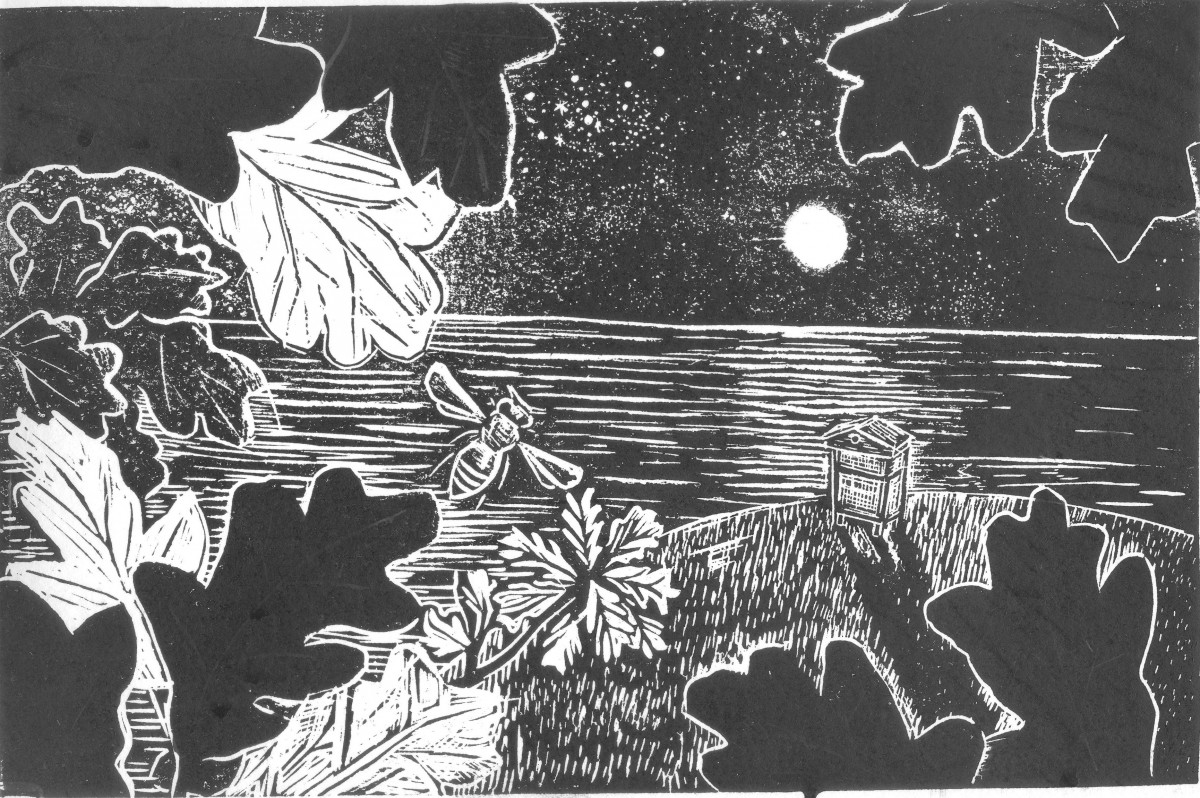Above: “Hunter’s Moon” by Angie Biltcliffe
Description
The intention of this contract – Wings of the Mineral Kingdom – is to explore the intersection of beekeeping practices and the principles of biodynamic agriculture, with specific focus on lunar, planetary, and astral correspondences and rhythms of cultivation in regard to bees. The crucial and unique link between honeybees and humanity is central to many forms of agriculture, and as massive, industrial, materialist practices of beekeeping continue to reveal their unsustainability, it is becoming more and more important to delve into the complex relationship between Earthbound organisms, subtle formative forces, and greater cosmic bodies in the context of keeping healthy beehives. During the fall of 2016 Aurora will read a number of books and other texts covering some histories and methods of beekeeping, introductions to biodynamic principles and beekeeping within a biodynamic system, and other related conceptions of naturally tending honeybees. Over the course of this contract she will write a number of essays in response to readings, keep an online journal, and ultimately construct a small illustrated booklet on the concepts and practices of biodynamic beekeeping.
Contract
Student: Aurora Sonenshine
Class Standing: SO
Term: Fall 2016
Title: Wings of the Mineral Kingdom
Credits: 4
Sponsor: Sarah Williams
| Learning Objectives | Activities | |
|---|---|---|
| What is beekeeping, and what is the nature and history of the relationship between humans and honeybees? | I will read First Lessons in Beekeeping by Keith S. Delaplane, as well as related journal articles and academic papers on the history of human-bee interrelationship. I will keep a reading journal and complete response essays after each text, and I will also create and maintain an online weekly WordPress journal documenting my writing and related ephemera. If possible, I also plan to attend meetings of the Olympia Beekeeper’s Association and reach out to local beekeeping peers. |
| How can I expand my understanding of beekeeping theories and practices within the context of biodynamic agriculture? | I will read and respond to Wisdom of the Bees: Principles for Biodynamic Beekeeping by Erik Berrevoets and Maria Thun’s The Biodynamic Year and Gardening for Life. In addition, I will attend and take detailed notes at a Biodynamic Beekeeping intensive taught by Gunther Hauk and Alex Tuchman at the 2016 North American Biodynamic Conference. For all events and texts I will keep a reading journal, craft reflective response essays, and create online journal entries with available writing and pictures. |
| What are some related ethics of bee-tending, and how could the practice of keeping bees fit into perennial, esoteric living food systems such as those envisioned using the principles of permaculture? | I will read and respond to The Shamanic Way of the Bee by Simon Buxton and Jacqueline Freeman’s Song of Increase, as well as an assortment of related academic articles and texts. After completing all readings and events, I will also create a small illustrated booklet summarizing much of what I learned during this contract and specifically addressing the “biodynamic” component of keeping bees. |
Related Experience
During the fall and winter of 2016 I completed the program ‘Times Past’ – focused on archaeology and geology – and continued on to take Introduction to Plant Biology during the spring quarter. In a more directly related vein, I took a beekeeping course in western Massachusetts during the winter and spring of 2010 and received a certificate of completion from the Hampton County Beekeepers Guild. Since then I have continued studying beekeeping practices through self-directed reading, and I have helped tend and propagate a number of hives in diverse settings under the direction of colleagues and friends.

September 26, 2016 at 7:03 pm